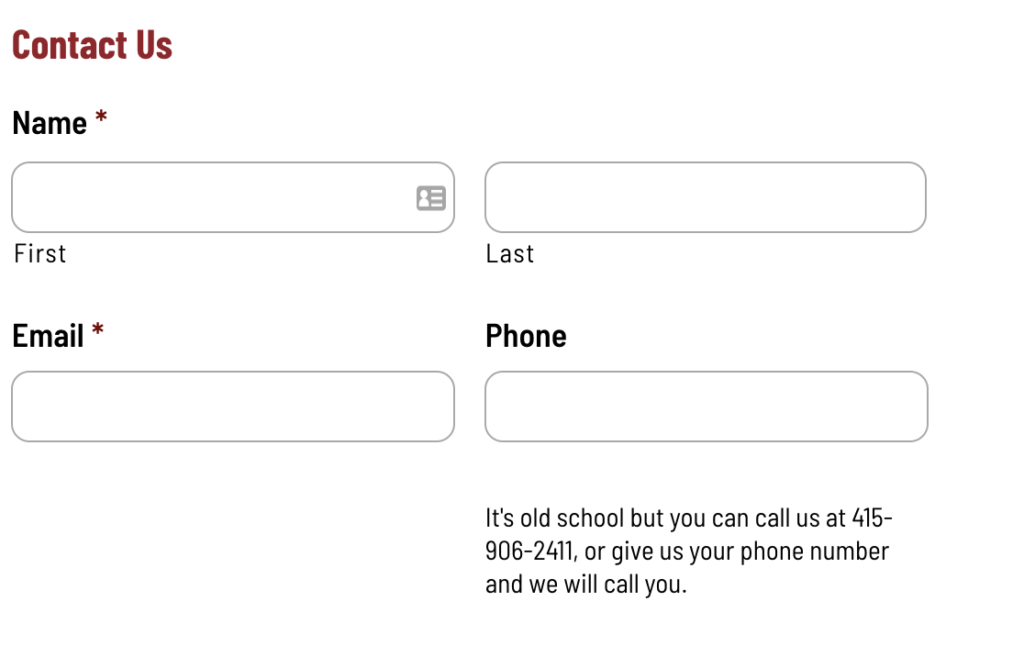Your cart is currently empty!

Why Your Website Needs A Privacy Policy!
Reading Time: 5 minutesAuthor:
Ok, I can hear you groan, and while I hear you and get you, having a website Privacy Policy is important. So, listen up.
We all know the main purpose of your website is to grow your business, right? Your website plays a big part in many things. It helps you connect with existing and potential customers. It’s there to showcase your offers and ensures you stand out from the crowd.
But a consequence of getting more leads through your website is the collection of Personally Identifiable Information (PII). It’s important that you know how this impacts your business. In this article, we’ll explain what this all means for your business and why it’s necessary to have a Privacy Policy in place.
Don’t worry, there are actually some great benefits you’ll receive from privacy law compliance that will make it all worthwhile. Also, it’s better to be safe and protected, than not, right?
If you collect PII You Need a Website Privacy Policy
The first thing to double-check is whether you actually need a website Privacy Policy. Most businesses only have a Privacy Policy, because it’s a requirement by law.
Privacy laws are in place to regulate the collection of PII. Therefore, it’s important to know whether your website requires one or not.
So what exactly is PII?
PII includes information such as names, emails, phone numbers, and IP addresses. This information is often collected through contact forms, email newsletter signups, or account creation forms. Another way this info can be collected is through analytics tools such as Google Analytics. Below is an example of a contact form that collects PII – names, emails, and phone numbers.

So, the things to look out for are whether any of your forms collects this kind of information. Also, check with Inn8ly regarding analytics programs. If you are answering yes to any of this, then your website collects PII and you’ll need a Privacy Policy in place.
What are the consequences of collecting PII?

PII information is sensitive. That’s because you are dealing with the personal details of your customers. So, it’s important that you have a clear explanation of how you collect that information. It’s also important that you make sure you comply with the privacy laws around the storage, use, and security of such information. You may also want to ensure you are compliant with privacy laws from other states and territories, especially if you do business in areas other than your local region.
When it comes to determining what privacy laws apply to you, the questions to ask include:
- Where do you do business?
- Where are your customers located?
- Whose PII does your website collect or could be collecting?
- Who do you offer your goods and services to
- Whose behavior are you tracking online through your analytics tools?
A great example of a broad reach of privacy laws is the California Online Privacy and Protection Act of 2003 (CalOPPA). This applies to business websites that collect the PII of California consumers. This law applies to almost all modern websites because Californian residents can submit their PII to any website.
In the USA, California, Delaware, and Nevada have all passed their own privacy laws. In addition, other countries such as the European Union and Canada have their own set of laws to adhere to. So, wherever you do business, check the privacy laws for that area in case your Privacy Policy needs to make specific disclosures.
States are proposing their own privacy laws that require websites to have a Privacy Policy. Not having a Privacy Policy in place, if it’s required, can lead to heavy penalties. Share on XNot having a website Privacy Policy in place if it’s required can lead to some heavy penalties. These range from $2,500 per violation up to $20 million or more. “Per violation” means per website visitor whose privacy rights you infringed upon.
These fines can add up fast! For example, if you have 100 website visitors from California per month, the fine would be calculated as $2,500 x 100. Ouch, right?
More and more states are proposing their own privacy laws that require websites that collect PII to have a Privacy Policy. Currently, there are a dozen or more privacy bills that would apply to businesses outside of those states. These bills would require businesses to have an up to date Privacy Policy.
Some of these bills, if passed, may even allow consumers to sue businesses directly for violations. So that means you must protect yourself by having a Privacy Policy in place, complying with the privacy laws. It’s also a wise idea to have a strategy in place to act quickly to changes as they are made, to keep up in real-time with the privacy laws of tomorrow.
Now for the benefits of having a Privacy Policy.
We promised you, there were some benefits, and here they are.
As we’ve mentioned above, having a Privacy Policy in place can help you avoid hefty fines and lawsuits for violations. In addition, as consumers become more concerned about sharing their personal data with businesses, having a clear policy outlining what is done with the information can help build trust with customers and prospects.
Privacy Policy FAQs
Write a strong website privacy policy in a plain, easy-to-understand language and update it regularly to reflect changes in the law in your business. Notify users about the changes.
Currently, software developers and everyone gathering Personally Identifying Information (PII) is legally required to have a website privacy policy by regulations like GDPR, PIPEDA and CaIOPPA.
For a sophisticated website, with a collection of series that track and store website visitors’ sessions, your website privacy policy should disclose how the cookies function.
No, you can’t. A website privacy policy is copyright-protected and can’t be copied without permission. Copying another website’s privacy policy could get you in trouble with regulators.
What should you do now?
Of course, you can do it yourself. Here are some resources you can use to craft a Privacy Policy for your website:
- You can ask your lawyer to craft something. It will be expensive, and we have no opinion as to their skill in doing this. It’s a bit specialized. Plus, the laws are changing, so the policy will need to be updated frequently, which generates even more expense.
- You can access legal template resources like LegalZoom or Rocket Lawyer or WebsitePolicies. These will be less expensive than having your lawyer develop the privacy policy. You may want to have your lawyer review the final template, and these resources have the same update challenge as the lawyer-generated policy.
Or you can subscribe to the Inn8ly Dynamic Privacy Policy product (services provided by Termageddon.) and get a policy statement that’s prepared by experts and updates automatically when the laws change for a fraction of the cost. And we’ll install and set up a Cookie Policy solution.
So, add a Privacy Policy to your website today. Isn’t it better to be safe, than sorry?
Related Posts
-
Why Your Website Needs A Privacy Policy!
States have or are proposing laws that require websites to have a privacy policy. Not having a privacy policy in place, if it’s required, can lead to heavy penalties.
Author: James Hipkin
Since 2010, James Hipkin has built his clients’ businesses with digital marketing. Today, James is passionate about websites and helping the rest of us understand online marketing. His customers value his jargon-free, common-sense approach. “James explains the ins and outs of digital marketing in ways that make sense.”
Use this link to book a meeting time with James.


